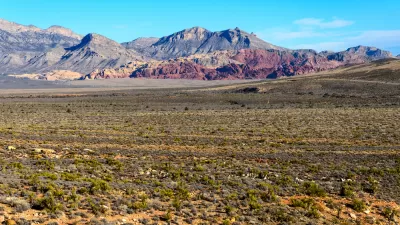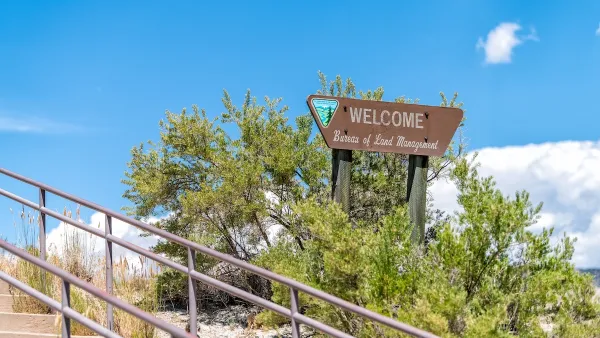Experts say monuments and “unappropriated” federal lands will likely be the target for expanded drilling, mining, and other development under a new Trump administration.

According to an article from Bloomberg, environmental groups are preparing for “copious litigation” in the coming years to hold the line against a second Trump administration’s efforts to open up federal land for fossil fuels and other development. “Though President-elect Donald Trump disavowed the Heritage Foundation’s Project 2025, his new administration is expected to take cues from its approach to public lands and natural resources development, and he repeatedly said on the campaign trail that he’d promote oil drilling,” writes reporter Bobby Magill.
The chapter of Project 2025 pertaining to federal lands was written by a former Bureau of Land Management official who served under the first Trump administration and calls for “a rapid ramp-up of oil, natural gas, and coal production,” including in the National Petroleum Reserve-Alaska and the Arctic National Wildlife Refuge, which the Biden administration moved to restrict last week.
While it remains unclear how much the Trump administration will rely on Project 2025, the document represents a “is a ‘wish list’ for the oil and gas and mining industries and private developers,” Melinda Taylor, senior lecturer at the University of Texas at Austin School of Law told Bloomberg. The article says, “Environmental attorneys and legal experts say they’ll be watching how the new administration approaches calls for the abolishment of national monuments, Utah’s push to take over public lands from the federal government, and its adherence to federal law.”
FULL STORY: Public Lands Outlook Under Trump to Face 'Copious Litigation'

Planetizen Federal Action Tracker
A weekly monitor of how Trump’s orders and actions are impacting planners and planning in America.

Maui's Vacation Rental Debate Turns Ugly
Verbal attacks, misinformation campaigns and fistfights plague a high-stakes debate to convert thousands of vacation rentals into long-term housing.

Restaurant Patios Were a Pandemic Win — Why Were They so Hard to Keep?
Social distancing requirements and changes in travel patterns prompted cities to pilot new uses for street and sidewalk space. Then it got complicated.

In California Battle of Housing vs. Environment, Housing Just Won
A new state law significantly limits the power of CEQA, an environmental review law that served as a powerful tool for blocking new development.

Boulder Eliminates Parking Minimums Citywide
Officials estimate the cost of building a single underground parking space at up to $100,000.

Orange County, Florida Adopts Largest US “Sprawl Repair” Code
The ‘Orange Code’ seeks to rectify decades of sprawl-inducing, car-oriented development.
Urban Design for Planners 1: Software Tools
This six-course series explores essential urban design concepts using open source software and equips planners with the tools they need to participate fully in the urban design process.
Planning for Universal Design
Learn the tools for implementing Universal Design in planning regulations.
Heyer Gruel & Associates PA
JM Goldson LLC
Custer County Colorado
City of Camden Redevelopment Agency
City of Astoria
Transportation Research & Education Center (TREC) at Portland State University
Jefferson Parish Government
Camden Redevelopment Agency
City of Claremont





























